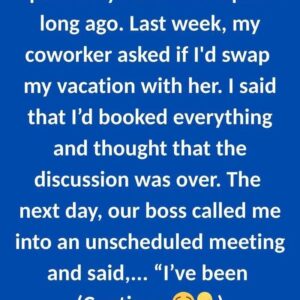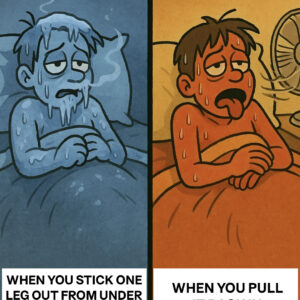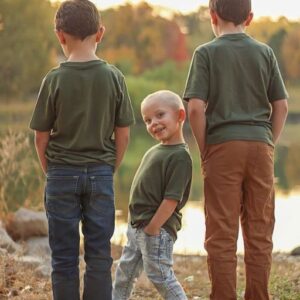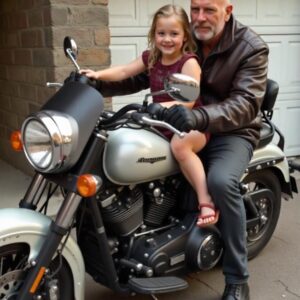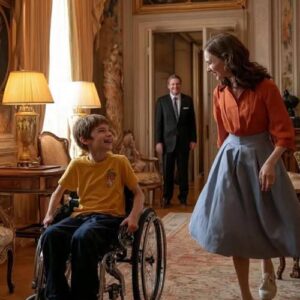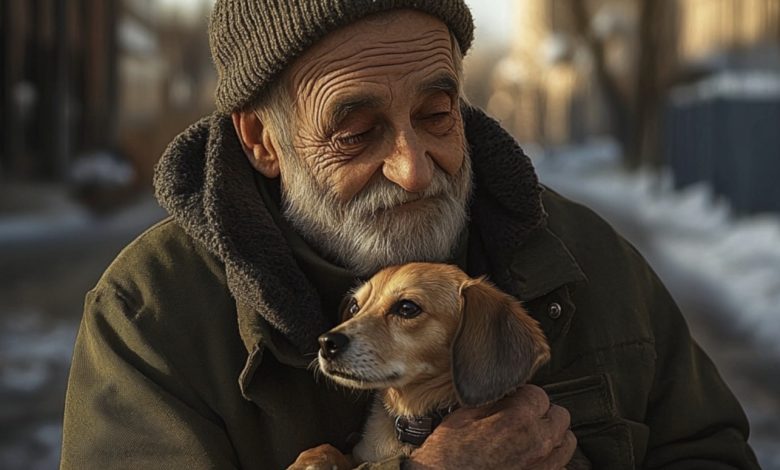
Sometimes the most unexpected moments change our lives forever. For me, it all began with a homeless man’s simple plea: “Will you take my dog?”
It had been a year since my husband, Jason, died in that terrible car accident. A year of waking up to an empty pillow, of stifled tears in the bathroom, of dragging myself through each day for our eight-year-old son, Liam. Some days felt impossible, but every morning when I looked at his bright eyes, I knew I had to keep going. He depended on me, and I wasn’t about to let him down.
Liam was the spitting image of his father, not just in looks but in kindness. If I ever felt myself slipping, he would wrap his little arms around me and whisper, “It’s okay, Mom. I’m here.” His words, soft and steady, reminded me that even in my darkest hours, there was still love and hope in our home.
That chilly afternoon, we were leaving the grocery store, bags piled in the trunk, when Liam tugged my sleeve. “Mom, look at that dog,” he said, eyes wide. Near the parking-lot entrance, a thin man sat on the curb under a tattered blanket. His face was red from the cold. Beside him, a small, scruffy dog huddled, shivering.
I glanced at the man, then at my son. We both knew we had little extra to spare. Between rent and bills and Liam’s after-school activities, our budget was already stretched thin. I sighed. “Honey, we can’t take on another responsibility right now,” I whispered, closing the trunk.
But as we turned to leave, the man rose unsteadily and called after us. I froze, my heart tightening. He shuffled forward, blanket slipping off his shoulders.
“Ma’am,” he said, voice trembling. “I’m sorry to bother you, but… could you take my dog?” He paused, shame and desperation warring on his face. “Her name’s Daisy. She’s all I’ve got, but I… I can’t care for her anymore. I don’t have enough food. She’s freezing out here. She deserves better.”
I opened my mouth to refuse, to explain our tight budget, but then Liam reached out and petted the dog’s head. Daisy’s wide eyes looked up at me with such trust. My son turned to me, voice small but firm. “Mom, please. She needs us.”
His plea and the man’s broken expression broke my resolve. I knelt and stroked Daisy’s rough fur. She leaned into my hand, quiet and trembling.
“All right,” I whispered. “We’ll take her.”
Tears spilled down the man’s cheeks. “Thank you,” he choked out. “Thank you so much.” He kissed Daisy’s head and shuffled back to his spot on the curb. We watched until he was out of sight.
Back home, Daisy curled at Liam’s feet that night, lying on his dinosaur blanket while he patted her head and murmured, “You’re safe now.” Listening to his gentle coos, I felt a warmth in my chest I hadn’t known since Jason died. Caring for Daisy—helping someone else’s beloved pet—gave me a new reason to be grateful for each sunrise.
Over the next few weeks, Daisy became our family’s heart. Liam fed her kibble, brushed her matted fur, and even read to her each night from “Goodnight Moon,” which she seemed to enjoy most. Her eager tail wags and playful barks filled our home with laughter. And I found that every time Daisy nudged me for attention, a piece of my sadness eased away.
Then, one evening about four weeks after we first met the man, I found a plain, unmarked envelope among our mail. Inside was a folded letter in shaky handwriting:
Dear Daisy,
I hope you’re warm and happy. I miss you more than anything, but I know I made the right choice. You deserve food, shelter, and people who love you. Every day I think of you, and knowing you’re safe helps me keep going.
I’m sorry I couldn’t be the one to care for you. Thank you for being my friend when I had no one else. I will never forget you.
Love,
Your old pal
Tears came so fast I barely caught them. Liam came into the kitchen and saw me holding the letter. He read it over my shoulder, then looked up, eyes shining. “Mom, we have to find him,” he declared. “He’s alone out there, and he needs our help.”
I nodded, my chest swelling with pride at my son’s big heart—the same heart his father had. “You’re right,” I whispered. “We’ll find him.”
The next morning, we packed a bag: a blanket, some extra dog food, peanut-butter sandwiches, warm socks, and our coats zipped tight. Liam insisted Daisy come along. “She’ll smell him,” he said with confidence. “And she’ll know where he is.”
We went first to the parking lot where we’d left the man that cold day, but he was nowhere in sight. The wind whipped around us, so we moved on, asking strangers if they’d seen him. Most shook their heads. Then a woman outside a coffee shop told us she’d spotted someone matching his description at a soup kitchen downtown.
Liam’s face lit up. “Let’s go!” he said, tugging me toward the car.
As we drove, Daisy sat alert in the backseat. When we arrived at the soup kitchen entrance, she perked up, nose twitching. “She smells him!” Liam cried.
Sure enough, under an old blanket on the sidewalk, we found the man again. He looked weaker than before—his cheeks sunken, clothes worn even thinner—but his eyes lit up when he saw Daisy. She pulled free of Liam’s small hand and bounded into his arms.
“Daisy!” he whispered, burying his face in her fur. “Oh, Daisy, my girl…” Tears fell down his weathered cheeks as he held her tight.
I stepped forward. “Hello,” I called. “I’m Emma—Liam and I have been taking care of Daisy.”
He looked up, gratitude flooding his face. “Thank you,” he said hoarsely. “Thank you for what you’ve done. I missed her every day, but I couldn’t give her what she needed. Seeing her now—” He swallowed hard. “It means everything.”
Liam, still holding Daisy’s leash, spoke earnestly. “You don’t have to say goodbye again. We’ll bring her to see you. We want you in her life.”
My heart swelled. “If you’d like,” I added. “We can visit whenever you want.”
A shaky smile spread across his face. He gave Daisy to me and stood, brushing invisible dirt from his coat. “My name’s Edward,” he said. “And I… I don’t know how to thank you.”
“We’re glad to help,” I said. “You’re welcome to visit any time.”
From then on, every other weekend, we brought Daisy and our bag of supplies to Edward. He would wrap his arms around Daisy carefully, brushing her fur while Liam and I chatted. We learned that Edward had once lived in a small house with a family who loved him—but after losing a job and then his home, he landed on the streets. Daisy had been his only friend in the hardest times. Giving her up had broken his heart, but he knew she’d have a safer life with us.
Seeing Edward and Daisy reunited healed a bit of my own soul, too. Each visit reminded me that kindness has a ripple effect—from the giver to the receiver and back again. Watching my son beam as he played with Daisy and Edward made me feel closer to Jason than I had in months.
A few months later, another letter arrived, this time with a return address:
Dear Emma and Liam,
I can’t thank you enough for saving Daisy and for giving me hope again. I found work washing dishes at a small café, and I’ve moved into a tiny apartment nearby. It’s not much, but it’s warm and it’s mine.
I’ll never forget your generosity. You gave both Daisy and me a second chance.
Gratefully,
Edward
My eyes blurred with tears as I read those words. Liam hugged me tight. “Look, Mom,” he said softly. “He’s okay.”
And he was. Edward joined us for dinner one crisp Sunday—something he’d never done before. We laughed over pancakes as Daisy snoozed by his chair. He told stories about his favorite childhood games, and Liam listened in awe. That evening, I caught Edward’s eye across the table as he sipped his coffee. We shared a quiet smile, both knowing how far we’d come from that first day in a freezing parking lot.
Sometimes when I feel the old sadness wash over me, I remember that day, too—the day a homeless man trusted me enough to ask for help, and the day my son rescued his dog. I remember how a single act of compassion can save more than a stray animal—it can heal broken hearts, rebuild spirits, and bring strangers together as friends.
Liam’s father, Jason, would have been proud. He always believed in the power of kindness and that every life—no matter how small—deserves care and respect. Watching my son grow into a young man who acts on that belief gives me hope for the future.
So if you ever hesitate when you see someone in need, think of Daisy and Edward. Think of how a small choice—saying “yes” instead of “no”—can change the course of someone’s life. We all have the power to make tomorrow brighter. Sometimes, it begins with the simplest question: “Will you take my dog?”
And sometimes, that question leads to a story of healing none of us could have imagined.
